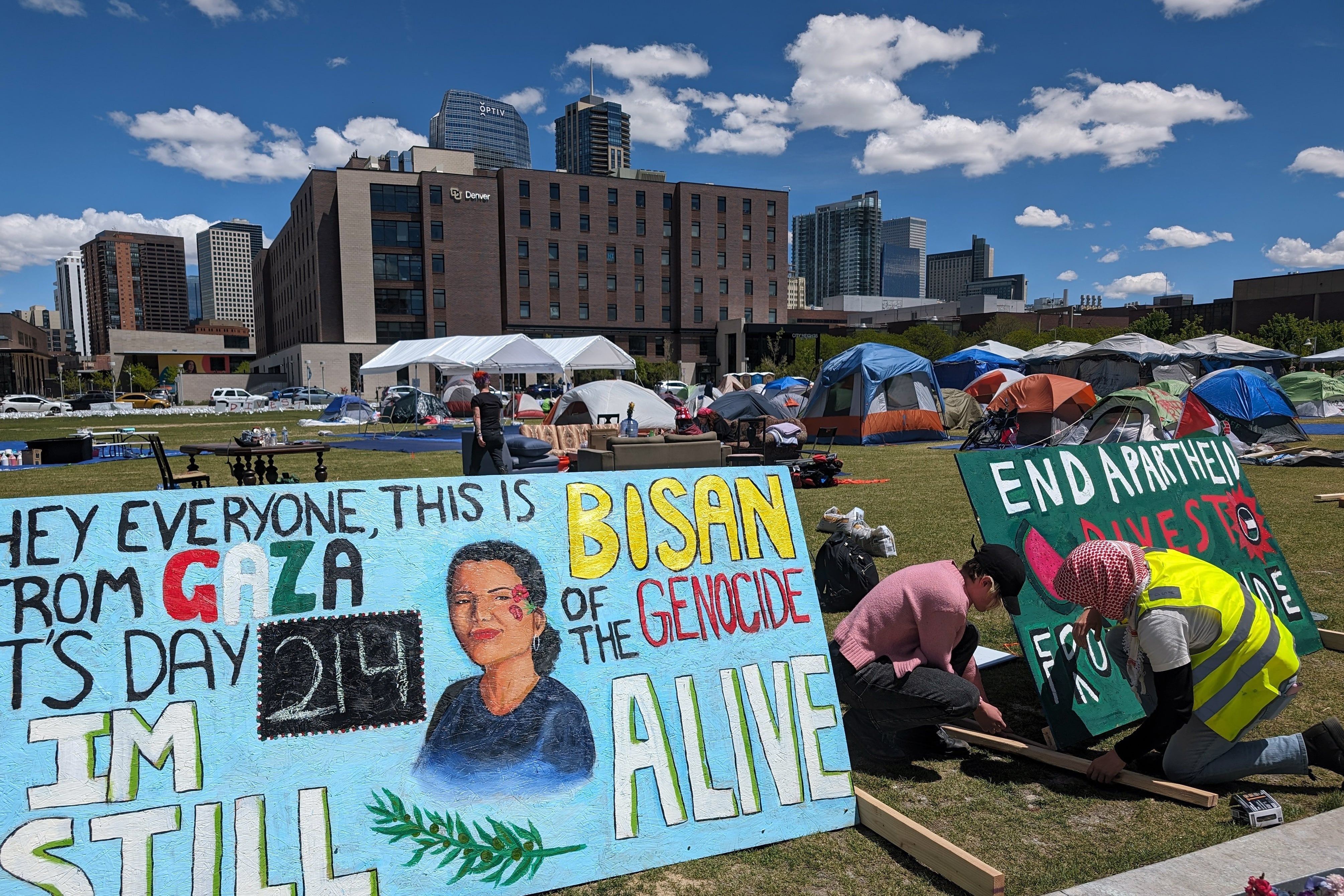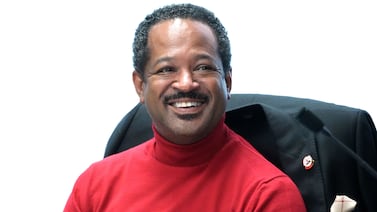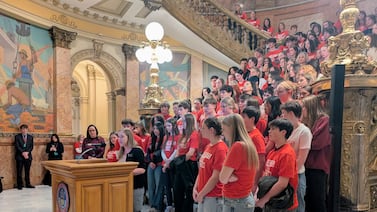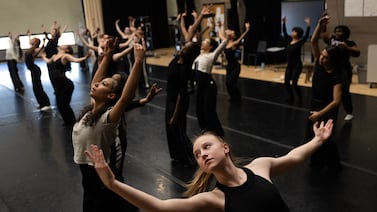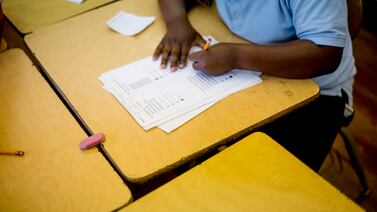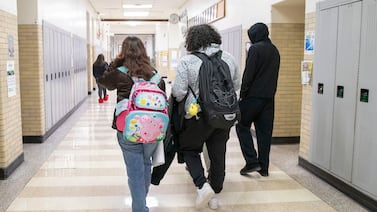Sign up for our free monthly newsletter Beyond High School to get the latest news about college and career paths for Colorado’s high school grads.
On a windy afternoon this week, students on Denver’s Auraria Campus snapped pre-graduation pictures and walked to finals. Most seemed to pay little attention to the quiet encampment of pro-Palestinian protesters that has taken over the quad.
Over the last two weeks, the encampment has grown into the largest of any of its kind on a Colorado university campus, with dozens of tents and at times holding up to a thousand protesters. But the setting differs from the recent protests at private colleges that have attracted the most attention nationally.
The public campus that houses Metropolitan State University of Denver, the University of Colorado Denver, and the Community College of Denver is largely composed of commuter students who are from low-income backgrounds, which stands in contrast to private campuses with the most high-profile protests, such as Columbia University in New York City.
The campus protesters against the Israel-Hamas war and U.S. involvement in it are part of a nationwide movement of students who have called for universities to divest from any corporations operating in Israel, among other demands. But as at other colleges, some Jewish students say the encampment should be taken down and that the protest has disturbed the climate on campus and made them feel less safe.
The protests have put university administrators in the uncomfortable position of attempting to balance student safety and free speech.
While the Auraria encampment has been mostly quiet, demonstrators have participated in various disruptions such as taking over the student union. The protests even resulted in arrests when the camp first started. Students have also considered disrupting this week’s graduation ceremonies.
It’s caused discord on one of Colorado’s most diverse public campuses. And not all who are involved in the encampment are students.
Here are five stories from students, some who attend the colleges and some who go to college online, about what they think about the protests.
Encampment gives pro-Palestinian student organizer hope
Tom Chaney, 23, sat at the edge of the MSU Denver quad keeping a watchful eye over the encampment, which is a mix of students and community members. He’s been there since the encampment began about two weeks ago, and he keeps busy with camp logistics.
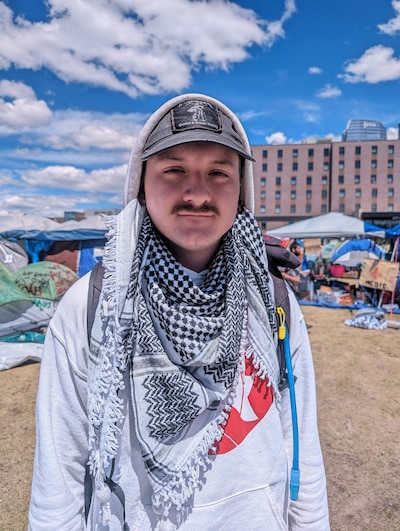
A few people have come by and yelled at the participants or even vandalized the camp, including tipping over portable toilets. Other protesters say people have come into the encampment and taken down tents or yelled at them.
But Chaney said the majority of students and community members have shown support. While he keeps watch, some even take time to draw or write statements in chalk.
The encampment has grown from a handful of tents to taking over most of the quad, said Chaney, a communications major at MSU Denver.
Chaney has been a pro-Palestinian organizer for over two years. The encampment is a way to raise awareness about what people there have faced before the war and since it began, he said.
He knows that as a commuter campus where many students also work, any support they can show is meaningful.
“It’s really kept us strong,” Chaney said.
Jewish student is on high alert amid protest
Morgan Shepherd, a junior at MSU Denver, has become more cautious over the last few weeks. He’s avoided protesters and given their encampment a wide berth when he visits the nearby Tivoli Student Union.
“I very much keep my head on a swivel,” he said. “It’s not the greatest situation.”
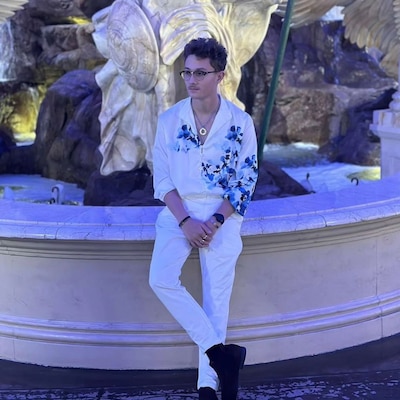
Shepherd, who is Jewish, doesn’t want to get caught in the middle of a confrontation between police and protesters, or stuck in a building that has been locked down. Reminders of the protest are everywhere — in sidewalk chalk messages around campus, on posters, and in the constant stream of text alerts on his phone.
Shepherd, a 20-year-old economics major from Aurora, views some of the protest slogans and imagery as antisemitic, including posters calling for intifada, an Arabic word for uprising. He said a previous intifada entailed years of suicide bombings that killed Israeli civilians. To him, the word is a battle cry for revolution against Israel.
“It’s just the scale of what they’re calling for that is more astonishing than anything,” he said.
Shepherd has never been to Israel, but has family there. One of his aunt’s relatives, an Israeli soldier, was captured during the fighting in Gaza after Oct. 7.
“They think he’s dead,” said Shepherd.
One student stresses privilege of ability to protest
Lucia Feast, 20, took a mid-morning final on Wednesday and then was back in the encampment about an hour later.
A Gender, Women and Sexualities studies major at MSU Denver, Feast felt drawn to the protest because not everyone has the privilege to participate, she said. She feels a responsibility to speak out about the human rights issues in Gaza that stem from the war. She said she couldn’t idly standby as tens of thousands were killed and millions more were displaced.
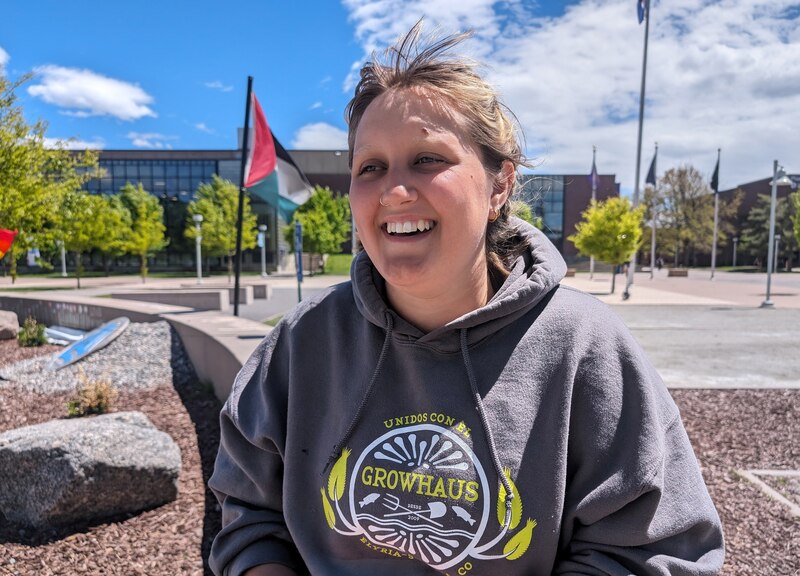
“I have more space for personal risks than most people and I want to use that when I can,” Feast said.
The Auraria campus is also a place where oppression has happened in the past, she said, including the displacement of the area’s residents. That connection makes the Israel-Hamas war real for students, many who come from traditionally underrepresented backgrounds, said Feast, who is white like many of the protesters.
And the protesters’ call for financial transparency from the university is important because tax money and student tuition go directly to the institution, she said.
She said the politics of the war are long and complicated, but she wanted to help lend a voice for those who couldn’t speak out against the war.
“It became pretty clear what I’ve had to do and put on the line to support those people,” she said.
‘People have absolutely no clue what Israel’s like’
Sam, a senior at the University of Colorado Denver who asked that his last name not be used in order to protect his privacy, first interacted with pro-Palestinian protesters on the Auraria campus last fall. That’s when a group of them gathered in front of the Golda Meir House Museum, where Israel’s first prime minister lived for a time.
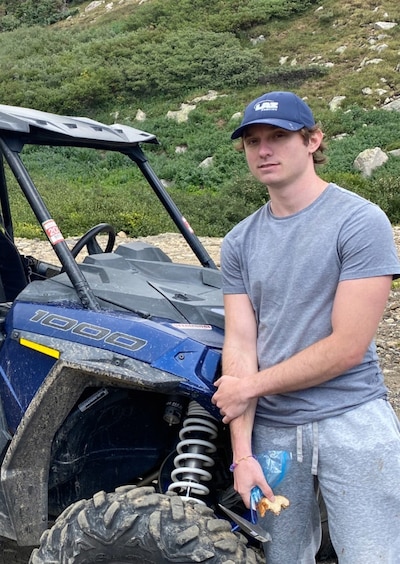
When Sam and his friend held up an Israeli flag, some of the protesters yelled, “You’re going to burn in hell” and called them names, he said.
“This is a hate mob right here,” he recalled thinking. “I was just like, ‘What is going on?’”
Sam has not generally worried about his safety amid campus protests. But he does think the encampment he’s passed this spring on the way to and from his computer science classes should be cleared.
“Our school has a no-camping policy so it should be shut down,” he said.
Sam, who’s originally from Miami, transferred to the University of Colorado Denver from the University of Florida two years ago. He’ll graduate after he takes one class during the summer term.
Sam said protesters’ narrative about Israel doesn’t match with what he saw there during a high school trip and later during an internship in the country on airport navigation.
“It’s not some crazy country that’s oppressing people,” he said. “It made me realize that people have absolutely no clue what Israel’s like.”
Pro-Palestinian camp influences student’s college plans
Sky Childress, 18, moved to Denver less than a month ago. She saw a TikTok about the encampment and decided she needed to act.
She’s been a constant at the protest ever since. MSU Denver is a public campus where Childress felt she could participate. Childress attends Arizona State University online.
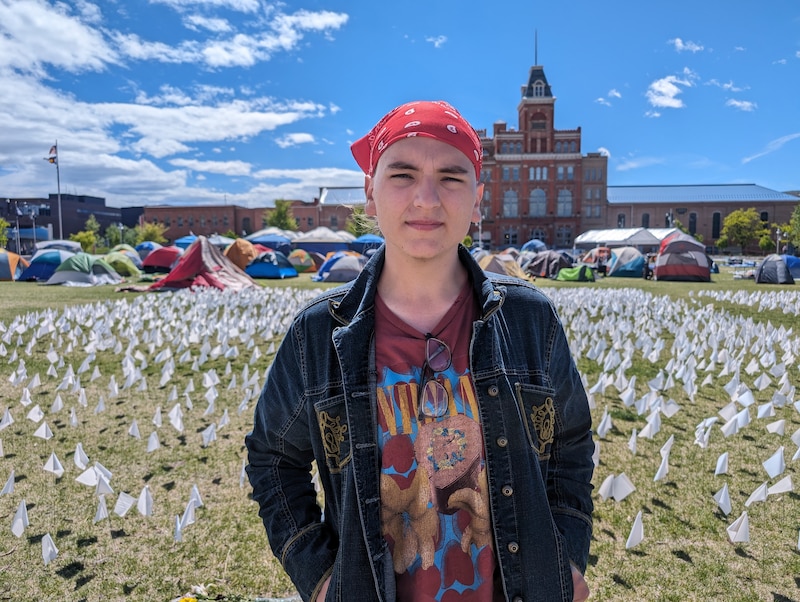
Remote students don’t have many options to voice their opinions at campuses, she said.
“There’s people all across the country that are sympathetic to our cause, and I really liked that,” she said. “And I wasn’t even at my own school.”
She said protesters have tried to be thoughtful, such as donating uneaten food to homeless shelters. She also said even if the protesters plan disruptions, they’re mindful that some students are studying for finals at this time.
Childress said the encampment has resonated with her. But she also said that what she cares about most is that children are dying in large numbers in the war. Behind the encampment are over 10,000 white flags that signify the kids who have died in the conflict — symbols of the war’s toll that have fueled her commitment to the encampment.
With all she’s learned, she plans to enroll at one of the Auraria campus colleges in the future. And she’s watching closely how university presidents react to their demands before she makes a decision.
Jason Gonzales is a reporter covering higher education and the Colorado legislature. Chalkbeat Colorado partners with Open Campus on higher education coverage. Contact Jason at jgonzales@chalkbeat.org.
Ann Schimke is a senior reporter at Chalkbeat, covering early childhood issues and early literacy. Contact Ann at aschimke@chalkbeat.org.

